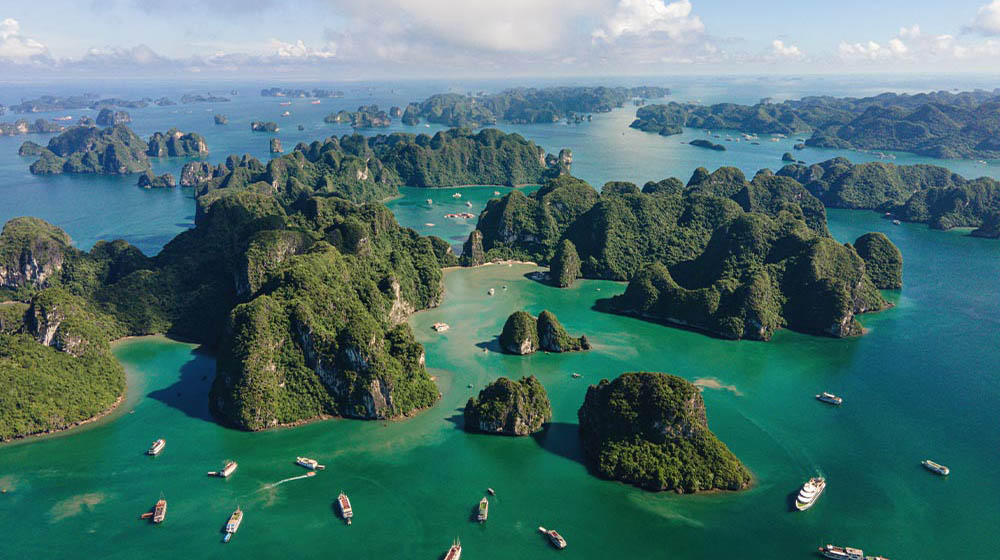Vietnam is one of the most popular travel destinations in Asia, especially among Europeans. No wonder, because Vietnam offers numerous sights for nature lovers and culture fans: paradisiacal islands along the coast of the South China Sea, the Mekong Delta, Halong Bay or the former Saigon, now Ho Chi Minh City, amaze travelers. Let yourself be inspired for an unforgettable trip to Vietnam. In this article you will find lots of useful information to help you plan your trip to Vietnam.
What documents do you need to travel to Vietnam?
- Austrian citizens need a passport that is valid for at least 1 month longer than the visa applied for. Please note, however, that airlines often require the passport to be valid for at least 6 months beyond the date of entry.
- A visa or e-visa is also required for a stay of up to 90 days. You can apply for an e-visa for Vietnam online at: https://evisa.gov.vn/. Important: Apply for the visa several weeks before your departure and be sure to print out the approved e-visa and bring it with you.
Make sure that the information in your visa application exactly matches the information in your passport. And check the visa you have received carefully before you start your trip to Vietnam. Errors in names or other data are common and can cause problems when you enter the country.
Important: E-visas cannot be extended. If you exceed the duration of your stay as a tourist, i.e. stay in Vietnam longer than your visa allows, you may be fined.
Our tip: Visit the website of the Austrian Foreign Ministry before you leave. Here you will find information about entry and security in Vietnam as well as the contact details of the Austrian Honorary Consulate in Ho Chi Minh City: https://www.bmeia.gv.at/reise-services/reiseinformation/land/vietnam.
When is the best time to travel to Vietnam?
The best time to visit Vietnam is between November and April. During this time, the weather is usually sunny and dry. In other words, ideal weather conditions for exploring the country. However, the climate can vary greatly from region to region. In the north of Vietnam, the months from November to April are the driest and most pleasant. If you prefer to travel to the center of Vietnam, the months between February and June are best. In the south of Vietnam, the period from December to April is the driest and sunniest.
Avoid traveling to Vietnam during the rainy season from May to October. Especially in August and September, when typhoons are frequent.
North Vietnam has a subtropical climate, while South Vietnam has a tropical climate. The maximum temperature throughout the country is 35 degrees.
How much should I budget for a trip to Vietnam?
The cost of living in Vietnam is quite low compared to many other countries. Transportation costs are also significantly lower than in Europe. Here are a few cost examples to give you an idea of the cost of living in Vietnam:
Average prices in the restaurant:
- Breakfast: approx. €1.80 per person.
- 3-course menu: approx. €11 per person.
- McDonald's menu: approx. €4.40 per person.
Average prices for an overnight stay in a hotel:
- 1-star hotel: approx. €32 per night
- 5-star hotel: approx. 102 € per night
Please note: These prices may vary depending on the city and season.
Which sights should you visit in Vietnam?
There is a lot to discover in Vietnam. We therefore recommend that you take a round trip to see as many places as possible. Plan your round trip in advance or get advice from a travel agency. Here are some sights that you should definitely visit:
Hanoi:
- Temple of Literature: Vietnam's main shrine and the country's first academy
- Old Quarter: stroll through narrow streets with traditional stores and a lively street scene
Halong Bay:
- Halong Bay: Natural wonder and UNESCO World Heritage Site with impressive limestone islands
Ho Chi Minh City:
- War Museum: moving museum about the Vietnam War
- Ben Thanh Market: Lively market for clothing, fabrics, shoes, fashion, handicrafts, fresh food and local cuisine
Hội An:
- Old Town of Hội An: Historic town with many canals, buildings from the French colonial era and wooden temples
Phong Nha-Kẻ Bàng:
- Phong Nha-Kẻ Bàng National Park: nature reserve with impressive caves and breathtaking landscapes
Mekong Delta:
- River cruise on the Mekong: floating villages and local specialties at floating markets
What culinary specialties are there in Vietnam?
Vietnamese cuisine is known for its freshness, balanced flavors and variety: fresh herbs, crunchy vegetables and tasty sauces create a harmonious balance between the flavors sweet, salty, sour, bitter and umami. Here we recommend a few dishes that you should definitely try:
Vietnamese main courses:
- Phở: Rice noodle soup with beef or chicken, garnished with fresh herbs and lime
- Bánh mì: Vietnamese sandwich made from crispy baguette, filled with meat, pickled vegetables, coriander and sauce
- Bún chả: Grilled pork meatballs, served with rice noodles, fresh herbs and a sweet and sour fish sauce
- Gỏi cuốn: Fresh spring rolls, often filled with prawns, pork, rice noodles and herbs, served with hoisin sauce or peanut sauce
Vietnamese desserts:
- Chè: Sweet dessert made from beans, fruit and jelly, often served with crushed ice and coconut milk
- Bánh da lợn: layer cake made from rice flour and mung bean paste, flavored with pandan leaves
Vietnamese drinks:
- Cà phê sữa đá: Vietnamese iced coffee with sweetened condensed milk
- Nước mía: Freshly squeezed sugar cane juice
Which vaccinations are recommended for a trip to Vietnam?
There are no mandatory vaccinations for a trip to Vietnam. However, some vaccinations are strongly recommended by the health authorities:
- Recommended vaccination: Hepatitis A
- Recommended vaccinations for longer stays, in rural areas or in poor hygienic conditions: Hepatitis B, dengue fever, Japanese encephalitis, typhoid, rabies, tetanus (make sure your vaccination is up to date).
In addition to vaccinations, you should also protect yourself against diseases that can be transmitted by mosquitoes, such as malaria or chikungunya fever. Take these measures to protect yourself from mosquito bites:
- Wear light-colored clothing that completely covers your body: long pants, long-sleeved shirts.
- Lubricate exposed areas of your body with insect repellent during the day and at night.
- Sleep under a mosquito net.
The quality of medical care in Vietnam
The quality of medical care and medical infrastructure in Vietnam depends greatly on whether you are treated in a private or public hospital. In public hospitals, the nursing staff or doctors may not speak English.
Before you leave, it is therefore important to take out good travel insurance that will help you in an emergency and cover your medical costs as well as any repatriation.
Useful telephone numbers for traveling to Vietnam
You should make a note of the following emergency numbers for your stay in Vietnam:
- Police: 113
- Fire department: 114
- Medical emergencies: 115
Remember to take out travel insurance to protect yourself against unexpected costs due to illness, accident or trip interruption. With comprehensive cover from Europäische Reiseversicherung, you are well protected worldwide. No matter where your trip takes you, Europäische Reiseversicherung offers you the right travel cover.


